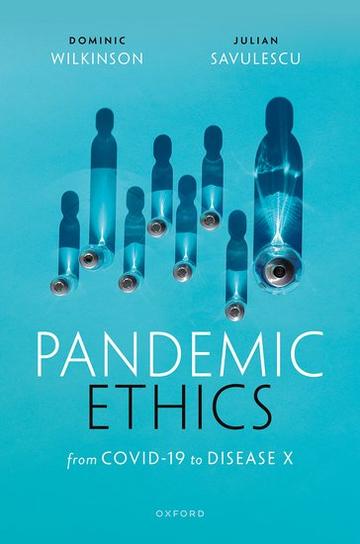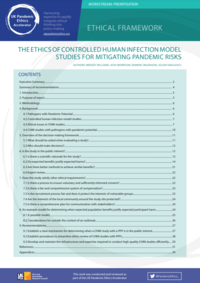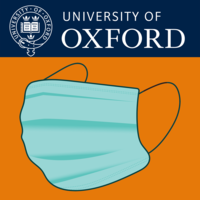UK Ethics Accelerator: Coordinating and Mobilising Ethics Research Excellence to Inform Key Challenges in a Pandemic Crisis
Harnessing expertise to rapidly integrate ethical thinking into policy-making
The UK Ethics Accelerator is a new initiative that brings UK ethics research expertise to bear on the multiple, ongoing ethical challenges arising during pandemics. We provide rapid evidence, guidance and critical analysis to decision-makers across science, medicine, government and public health. We also support public debate on key ethical challenges.
The Ethics Accelerator was funded by the UKRI Covid-19 research and innovation fund, grant number AH/V013947/1
Project dates: Dec 2020 - Jul 2022
About the UK Ethics Accelerator Project


PI: Ilina Singh
Co-Investigator: Julian Savulescu
Funder: UKRI Covid-19 research and innovation fund, grant number AH/V013947/1.
UK Ethics Accelerator: Coordinating and Mobilising Ethics Research Excellence to Inform Key Challenges in a Pandemic Crisis
The COVID-19 crisis demands that policy-makers, researchers, health and social care workers, and members of the public address unprecedented ethical dilemmas on a daily basis. Resolving these is hard, and it is risky. The complexity and speed of ethical challenges are leading to harms—some inevitable, some avoidable—on a significant scale. The main aim of the Ethics Accelerator (EA) is to harness and mobilise existing UK ethics research expertise to bear on these multiple, ongoing ethical challenges. The EA will rapidly provide evidence, guidance and critical analysis to decision-makers, helping to improve decision-making over the evolving pandemic response. A second aim is to enable systematic public deliberation around key ethical challenges. A third aim is to identify strategies to embed ethics at the core of future epidemic preparedness. The EA will leverage and promote a broad network of UK and international researchers to create flexible Taskforces that deliver rapid guidance and responsive advice to leadership in government, science, medicine, and public health. It will establish virtual fora for public discussion, deliberation and information about arising ethical challenges. In coordinating and focusing existing national investments in ethics research, the EA adds significant value and scales up the potential impacts of ethics research in science, medicine, policy and society. Primary outputs will be rapid research reviews; policy guidance; commissioned research; a broad peer review body; and stakeholder engagements. Main outcomes will be decision-making that is informed by ethics expertise, and is more transparent and accountable, thereby improving public trust.
The Ethics Accelerator was funded by the UKRI Covid-19 research and innovation fund, grant number AH/V013947/1. The project has now reached the end of its grant period (ending July 2022), however the project's main website will be updated with additional materials and remain available as a resource.
This page contains information on the outputs of OUC Researchers (Dominic Wilkinson, Jonathan Pugh and Julian Savulescu). For more information on the project, its team members and other outputs, please visit the project's main website.
Resources
Pandemic Ethics: From COVID-19 to Disease X
Edited by Julian Savulescu and Dominic Wilkinson

Oxford University Press
Covers key ethical debates that arose during the COVID-19 pandemic
Includes contrasting perspectives from international experts in philosophy, ethics and economics
Identifies key lessons and suggestions for future pandemics
The COVID-19 pandemic is a defining event of the 21st century. It has taken over eighteen million lives, closed national borders, put whole populations into quarantine and devastated economies.
Yet while COVID-19 is catastrophic, it is not unique. Children who have been home-schooled during COVID-19 will almost certainly face another pandemic in their lifetime - one at least as bad-and potentially much worse-than this one. The WHO has referred to such a future (currently unknown) pathogen as “Disease X”.
The defining feature of a pandemic is its scale-the simultaneous threat to millions or even billions of lives. That scale leads to unavoidable ethical dilemmas since the lives and livelihood of all cannot be protected.
But since one of the most powerful ways of arresting the spread of a pandemic is to reduce contact between people, pandemic ethics also challenges some of our most widely accepted ethical beliefs about individual liberty and autonomy.
Finally, pandemic ethics brings vividly to the foreground debates about the structure of society, inequalities, disadvantage and our global responsibilities.
In this timely and vital collection, Dominic Wilkinson and Julian Savulescu bring together a global team of leading philosophers, lawyers, economists, and bioethicists. The book reviews the COVID-19 pandemic to ask not only 'did our societies make the right ethical choices?', but also 'what lessons must we learn before Disease X arrives?'
Published by Oxford University Press, 1 May 2023
Links
OUP webpage | Amazon | Press Release
Open Access Chapters

We acknowledge the support of the Wellcome Trust and Oxford University Press in making the following chapters freely available:
- Introduction, Dominic Wilkinson & Julian Savulescu
- Selective Lockdowns: Can they be Justified?, Julian Savulescu
- Pluralism and Allocation of Limited Resources: Vaccines and Ventilators, Dominic Wilkinson
- Ethical hotspots in infectious disease surveillance for global health security: social justice and pandemic preparedness, Michael Parker
Watch
YouTube Interviews on Pandemic Ethics with Professor Dominic Wilkinson, Professor Julian Savulescu and other contributing authors.
Listen/download
Introductory chapter, read by Professor Dominic Wilkinson
Music by ArtMusic from Pixabay
The Editors

|
Professor Dominic Wilkinson is Professor of Medical Ethics and Deputy Director of the Oxford Uehiro Centre for Practical Ethics, University of Oxford. |

|
Professor Julian Savulescu is Chen Su Lan Centennial Professor of Medical Ethics National University of Singapore, where he directs the Centre for Biomedical Ethics. |
Podcasts
Pandemic Ethics Accelerator Podcasts
The UK Pandemic Ethics Accelerator was a project to examine the ethical challenges faced during pandemics. It combined expertise from the Universities of Oxford, Bristol, Edinburgh, University College London, and the Nuffield Council on Bioethics. This six-part podcast series is hosted by David Edmonds and covers some of the themes that emerged from the research.
Audio and transcripts available at Oxford Podcasts.
UK Pandemic Ethics Accelerator Podcasts
The UK Pandemic Ethics Accelerator has commissioned a four-part podcast mini-series, focusing on pandemic ethics, in collaboration with the longstanding, successful Going Viral the Podcast, hosted by the medical historian and science writer, Mark Honigsbaum.
Episode 1: Anjana Ahuja, Professor Sarah Cunningham-Burley, Rev Charles Kwaku-Odoi, Professor Christina Pagel
Who Do We Trust In a Pandemic?
Episode 2: Dr. Charlotte Augst, Dr. Halima Begum, Pastor Mick Fleming, Dr. Beth Kamunge-Kpodo, Professor Sir Michael Marmot
Were Unequal Outcomes Inevitable during Covid-19?
Episode 3: Anjana Ahuja, Ceinwen Giles, Martin McKee, Matt Fowler and Dominic Wilkinson
How Many Deaths Are Too Many?
Episode 4: Ilina Singh, James Wilson, Catherine Joynson and John Prideaux
What Would an Ethical Pandemic Look Like?
Bonus Episode: Professor Sir Michael Marmot
Interview With Sir Michael Marmot on Covid Inequalities
Media/blogs
Practical Ethics in the News blogs
Published December 16, 2021 | By Julian Savulescu and Alberto Giubilini
Shaming unvaccinated people has to stop. We’ve turned into an angry mob and it’s getting ugly
[crosspost with The Conversation]
Published November 23, 2021 | By Alberto Giubilini and Julian Savulescu
Mandatory Vaccination Should Be Selective, Not General
Published November 16, 2021 | By Jonathan Pugh, Dominic Wilkinson, and Julian Savulescu
Selective lockdowns can be ethically justifiable – here’s why (republished from The Conversation, read the original article).
Published November 12, 2021 | By Alberto Giubilini
Why COVID passes are not discriminatory (in the way you think they are) (republished from The Conversation, read the original article).
Published November 10, 2021 | By Dominic Wilkinson, Jonathan Pugh, Julian Savulescu
NHS and Care Home Mandates Should Take Account of Natural Immunity to COVID
Published August 4, 2021 | By Alberto Giubilini and Erica Charters
The end of the COVID-19 pandemic
Published July 23, 2021 | By Dominic Wilkinson and Trish Greenhalgh
COVID: Media Must Rise Above Pitting Scientists Against Each other – Dealing With the Pandemic Requires Nuance [crosspost with The Conversation]
COVID: Why We Should Stop Testing in Schools [crosspost with The Conversation]
Published July 7, 2021 | By Dominic Wilkinson, Jonathan Pugh and Julian Savulescu
Pfizer Jab Approved for Children, but First Other People need to be Vaccinated [crosspost with The Conversation]
Published June 4, 2021 | By Dominic Wilkinson, Jonathan Pugh and Julian Savulescu
Suspending The Astra-Zeneca Vaccine and The Ethics of Precaution
Published March 16, 2021 | By Jonathan Pugh, Dominic Wilkinson, and Julian Savulescu
Is it Irrational Not to Have a Plan? Should There Have Been National Guidance on Rationing in the NHS? [cross-posted in the Journal of Medical Ethics Blog]
Published March 2, 2021 | By Dominic Wilkinson and Jonathan Pugh
Self-experimentation with vaccines
Published February 24, 2021 | By Jonathan Pugh, Dominic Wilkinson and Julian Savulescu [cross-posted in the Journal of Medical Ethics Blog]
An Ethical Review of Hotel Quarantine Policies For International Arrivals
Published February 23, 2021 | By Jonathan Pugh, Dominic Wilkinson, Julian Savulescu
Cross-Post: Is It Ethical To Quarantine People In Hotel Rooms?
Published February 11, 2021 | By Jonathan Pugh and Dominic Wilkinson [originally published in The Conversation on 11 February 2021]
Cross-Post: Not Recommending AstraZeneca Vaccine For The Elderly Risks The Lives Of The Most Vulnerable
Published February 8, 2021 | By Jonathan Pugh and Julian Savulescu [cross-posted in The Conversation on 5 February 2021]
Ethical Considerations For The Second Phase Of Vaccine Prioritisation
Published January 22, 2021 | By Jonathan Pugh and Julian Savulescu
Even Though Mass Testing For COVID Isn’t Always Accurate, It Could Still Be Useful – Here’s Why
Published January 4, 2021 | By Jonathan Pugh [originally published in The Conversation on 22 December 2020]
Print and online media
The Conversation: Dominic Wilkinson, Alberto Giubilini, Julian Savulescu (4 February 2022)
Is this the end of the road for vaccine mandates in healthcare?
[crosspost with Practical Ethics in the News]
The Conversation: Dominic Wilkinson, Jonathan Pugh and Julian Savulescu (26 January 2022)
Vaccine mandates for healthcare workers should be scrapped – omicron has changed the game
The Conversation: Julian Savulescu, Dominic Wilkinson and Jonathan Pugh (6 December 2021)
Why the UK shouldn’t introduce mandatory COVID vaccination
The Conversation: Dominic Wilkinson and Jonathan Pugh (3 December 2021)
Omicron: better to be safe (and quick) than sorry
The Conversation: Dominic Wilkinson, Jonathan Pugh and Julian Savulescu (4 June 2021)
Pfizer jab approved for children, but first other people need to be vaccinated
The Week UK: Dominic Wilkinson, Jonathan Pugh and Julian Savulescu (7 June 2021)
The moral questions behind vaccinating children against Covid-19: Pfizer jab has been approved for use in adolescents - but experts caution against immediate rollout
Science Media Centre: Dominic Wilkinson (4 June 2021)
Expert reaction to MHRA extending the UK approval of the Pfizer-BioNTech COVID-19 vaccine to allows its use in 12- to 15-year-olds
Coverage arising from SMC article includes:
- Huffington Post (quotes Adam Finn and Dominic Wilkinson)
- Independent (quotes Russell Viner and Dominic Wilkinson)
- BBC News (quotes Russell Viner and Dominic Wilkinson)
- The Guardian (quotes Adam Finn and Dominic Wilkinson)
- Mirror (quotes Adam Finn and Dominic Wilkinson
- Express (quotes Adam Finn and Dominic Wilkinson)
The Conversation: Jonathan Pugh, Dominic Wilkinson and Julian Savulescu (16 April 2021)
Learning to live with COVID – the tough choices ahead [cross-posted in Practical Ethics in the News]
LBC Radio: Dominic Wilkinson (17 April 2021)
Outrage over vaccine passports 'an overreaction,' claims medical expert
The Conversation: Julian Savulescu, Dominic Wilkinson, Jonathan Pugh and Margie Danchin (25 March 2021)
There’s no need to pause vaccine rollouts when there’s a safety scare. Give the public the facts and let them decide
The Conversation: Jonathan Pugh and Dominic Wilkinson (11 March 2021)
COVID vaccines: is it wrong to jump the queue?
Policy and Advice
Highlights

'The Ethics of Controlled Human Infection Model Studies for Mitigating Pandemic Risks' Report commissioned by 1Day Sooner (March 2023) Authors: Bridget Williams, Josh Morrison, Dominic Wilkinson, Julian Savulescu This report provides guidance on when it may be appropriate to conduct CHIM studies and the requirements for their ethical conduct. This includes guidance on conducting CHIM studies prior to an outbreak and at the beginning of an outbreak with a known PPP or novel pathogen that may have pandemic potential. The report has been developed for the context of the UK. It aims to inform UK policymakers, researchers, regulators, and members of research ethics committees. 1Day Sooner aims to reduce the global burden on infectious disease and avert future pandemics by working to accelerate the development and implementation of vaccines, treatments, and mechanical interventions. They do so as advocates for people who want to be in high-impact medical studies, including human challenge studies. |
UK Government
Members of OUC have submitted evidence to Parliamentary committees on COVID-19:
Written evidence from Dr Jonathan Pugh, Dr Lisa Forsberg, and Dr Thomas Douglas (COV0255)
'Restrictions of Liberty in Public Health, Medical Treatment, and Human Rights in The COVID-19 Pandemic'
Link to report: https://committees.parliament.uk/writtenevidence/9404/pdf
Written evidence from Dr Lisa Forsberg, Dr Isra Black, Dr Thomas Douglas, Dr Jonathan Pugh (COV0220)
'Compulsory vaccination for Covid-19 and human rights law'
Link to report: https://committees.parliament.uk/writtenevidence/9253/pdf/
Written evidence from the Wellcome Centre for Ethics and Humanities (COV0156)
On maintaining public health whilst upholding human rights
Contributors from OUC include Dr Jonathan Pugh, Dr Stephen Rainey and Joseph Nguyen
Link to report: https://committees.parliament.uk/writtenevidence/8681/html/
Other
Report commissioned by 1Day Sooner (March 2023)
'The Ethics of Controlled Human Infection Model Studies for Mitigating Pandemic Risks'
Authors: Bridget Williams, Josh Morrison, Dominic Wilkinson, Julian Savulescu
Link to report
1Day Sooner aims to reduce the global burden on infectious disease and avert future pandemics by working to accelerate the development and implementation of vaccines, treatments, and mechanical interventions. They do so as advocates for people who want to be in high-impact medical studies, including human challenge studies.
Exit Statement 'COVID-19: Ethical guidelines for the Exit Strategy', Alberto Giubilini and Julian Savulescu (1 October 2020).
"The UK “Exit Strategy”, which aims at safely easing the restrictions introduced in March 2020 to contain the COVID19 epidemics in the UK, needs to balance different values and priorities, beyond protecting the population from the virus. The task will be made even more difficult by the fact that Exit Strategy will have to be responsive to likely new spikes of COVID-19 cases, if not by an actual second wave of the virus."
Link to Exit Statement PDF.
World Health Organization Report 'Key criteria for the ethical acceptability of COVID-19 human challenge studies' cites papers by Julian Savulescu, Tom Douglas, Hannah Maslen and Alberto Giubilini (6 May 2020)
Controlled human challenge studies involves the deliberate infection of healthy volunteers. They are particularly useful for testing multiple vaccine candidates quickly and efficiently, as well as providing data on the processes of transmission, infection and immunity. Aimed at scientists, policy-makers and regulators, the report outlines the criteria that would need to be met for human challenge studies on COVID-19 to be ethically acceptable.
Link to report: https://apps.who.int/iris/bitstream/handle/10665/331976/WHO-2019-nCoV-Ethics_criteria-2020.1-eng.pdf?ua=1
Cited papers:
- Schaefer G, Tam CC, Savulescu J, Voo TC. Covid-19 vaccine development: time to consider Sars-Cov-2 challenge studies? SSRN Electronic Journal. January 2020. Link to paper on SSRN.com - SSRN REGISTRATION REQUIRED (FREE)
- Bambery B, Douglas T, Selgelid MJ, Maslen H, Giubilini A, Pollard AJ et al. Influenza vaccination strategies should target children. Public Health Ethics. 2018;11(2):221–34. Link to paper on OUP website - OPEN ACCESS
- Bambery B, Selgelid M, Weijer C, Savulescu J, Pollard AJ. Ethical criteria for human challenge studies in infectious diseases. Public Health Ethics. 2015;9(1):92–103. Link to paper on OUP website - FREE
Journal Articles
Chuan Voo, T., Savulescu, J., Schaefer, O., Ho Zhi Ling, A. and Tam, C. C., (2022), 'COVID-19 differentiated measures for unvaccinated individuals: The need for clear goals and strong justifications', Vaccine, Vol: 40(36): 5333-5337 [PMC9221926]
Palacios‐González, C., Pugh, J., Wilkinson, D. and Savulescu, J., (2022), 'Ethical heuristics for pandemic allocation of ventilators across hospitals', Developing World Bioethics, (22:1)
Dao, B., Savulescu, J., Suen, J., Fraser, J. and Wilkinson, D., (2021), 'Ethical factors determining ECMO allocation during the COVID-19 pandemic', BMC Medical Ethics, Vol: 22(1): 70 [PMC8169422]
Giubilini, A., Pugh, J., Savulescu, J. and Wilkinson, D., (2022), 'Vaccine mandates for healthcare workers beyond COVID-19', Journal of Medical Ethics, Vol: 49(3): 211-220 [PMC9985724]
Giubilini, A., Savulescu, J. and Wilkinson, D., (2021), 'Which Vaccine? The Cost of Religious Freedom in Vaccination Policy', Journal of Bioethical Inquiry, Vol: 18(4): 609-619 [PMC8696246]
Kappes, A., Zohny, H., Savulescu, J., Singh, I., Sinnott-Armstrong, W. and Wilkinson, D., (2022), 'Race and resource allocation: An online survey of US and UK adults’ attitudes towards COVID-19 ventilator and vaccine distribution', BMJ Open, Vol: 12(11):e062561 [PMC9679868]
Levy, N. and Savulescu, J., (2021), 'After the Pandemic: New Responsibilities', Public Health Ethics, Vol: 14(2): Pages 120–133 [PMC7989173]
Pugh, J., Seah, M., Carr, A. and Savulescu, J., (2023), 'Tackling the COVID elective surgical backlog: Prioritising need, benefit or equality?', Clinical Ethics, Vol: 18(4)
Pugh, J., Wilkinson, D., Kerridge, I. and Savulescu, J., (2022), 'Vaccine Suspension, Risk, and Precaution in a Pandemic', Journal of Law and the Biosciences, Vol: 9(1) [ PMC8928173]
Pugh, J., Wilkinson, D., Brown, R. and Savulescu, J., (2022), 'The Unnaturalistic Fallacy: COVID vaccine mandates should not discriminate against natural immunity', Journal of Medical Ethics, Vol: 48(6): 371-377 [PMC9132858]
Pugh, J., Wilkinson, D., Palacios Gonzalez, C. and Savulescu, J., (2021), 'Beyond Individual Triage: Regional Allocation of Life-Saving Resources such as Ventilators in Public Health Emergencies', Health Care Analysis, Vol: 29, pp. 263–282 [PMC7867404]
Pugh, J., Wilkinson, D. and Savulescu, J., (2022), 'Sense and sensitivity: can an inaccurate test be better than no test at all?', Journal of Medical Ethics, Vol: 48(5): 329-333 [PMC9046741]
Savulescu, J., Giubilini, A. and Danchin, M., (2021), 'Global Ethical Considerations Regarding Mandatory Vaccination in Children', The Journal of Pediatrics, Vol: 231(April): 10-16 [PMC7817402]; and
Authors' reply: Reply to Sprengholz and Betsch, The Journal of Pediatrics, online (17 August 2021)
Simon Thomas, E., Peiris, B., Di Stefano, L., Rowland, M. J. and Wilkinson, D., (2021), 'Evaluation of a hypothetical decision-support tool for intensive care triage of patients with COVID-19', Wellcome Open Research, 6-183 [Open Access]
Wilkinson, D., Finlay, I., Pollard, A., Forsberg, L. and Skelton, A., (2021), 'Should we delay covid-19 vaccination in children?', BMJ, Vol: 374:n1687 (Paper cited in EurekAlert! | Mirage)
Zohny, H., Davies, B. and Wilkinson, D., (2022), 'Affirmative action in healthcare resource allocation: Vaccines, ventilators and race', Bioethics, Vol: 36(9): 970-977 [PMC9539241]




